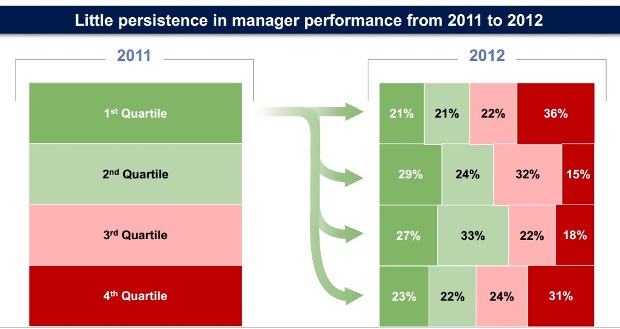(September 19, 2013) — If your hedge fund’s performance has taken a turn for the worse, it could just be part of a natural process, or it could be a sign the manager is not pulling his weight Goldman Sachs Asset Management (GSAM) has warned.
Kent Clark, CIO for hedge fund strategies, alternative investment, and manager selection at GSAM, told an audience at the company’s annual London investor conference that his team has a novel way to check whether a manager has his eye on the right ball.
Clark’s team watches the golfing round-recording site run by the PGA to watch out for managers updating their handicaps, which can indicate they’ve been spending too much time on the fairway, and not enough time by their Bloomberg.
Aside from monitoring golf prowess, however, Kent has a more concrete numerical basis for evaluating why a manager may be misfiring.
“There is little persistence in manager performance,” said Kent. “We find that the funds that are in the top quartile one year are often in the bottom quartile the next.”
This is especially true in the extremes, with the very top often ending up as the very bottom performer a year later. “Often the highest performers are the biggest risk-takers,” said Kent.
As the diagram shows, almost a quarter of the top performing funds end up in the bottom drawer 12 months later.
In an earlier panel session, Barclays pension CIO Tony Broccado told attendees he had no qualms in dumping an outperforming manager as he and his team took the view that high returns could not be indefinitely sustained.
That managers might not be shooting the lights out across the board, however, may be no fault of their own, Clark said.
The slices making up the average hedge fund return profile have been altered by market conditions, which have hampered the overall performance.
Returns from varying beta have shrunk from earning an annual 1.6% in the 11 years to the end of December 2006 to losing 0.4% in the following six year period. The same loss was made by strategic beta in the six years to the end of December 2012, down from making a 3.3% return in the first period. The risk-free rate used to produce 3.8% for hedge fund managers, but over the last five years it has returned just 1%.
The alpha section has actually increased, but only marginally, from 3.6% to 3.7% (but only if the manager is not regularly hitting the 19th hole).
Related content: Top Quartile but for How Long?

Source: GSAM, HFR Database, Per Trac Indices Database
